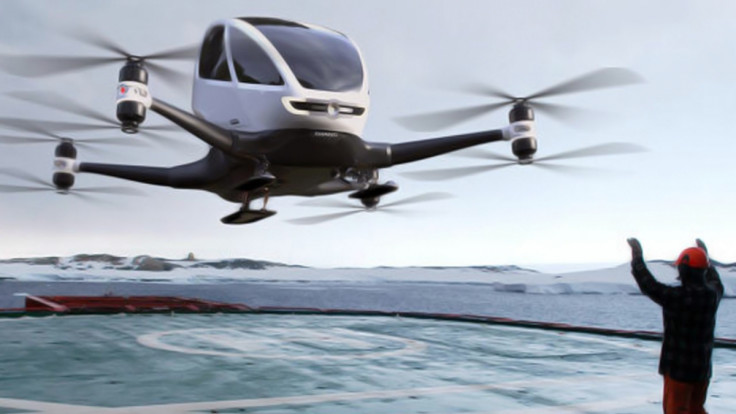Human-carrying drone Ehang 184 to deliver artificial organs for emergency transplants

Chinese drone technology firm Ehang has signed a major deal with US-based regenerative medicine firm Lung Biotechnology to provide 1,000 units of the world's first autonomous drone for humans, making it possible to speed up the transportation of artificial human organs for transplants.
At January's Consumer Electronics Show (CES 2016) in Las Vegas, Ehang unveiled its oneseat, human-carrying drone Ehang 184 to the world for the first time. The autonomous unmanned aerial vehicle (UAV) is 4.5ft tall and weighs 440lbs.
It is completely automated, so the passenger doesn't need to pilot it. All the person needs to do is enter a destination into a mobile app that is synced with Google Maps and the drone's onboard software, and the drone will then fly to the destination by itself. The Ehang 184 can travel a distance of over 10 miles at speeds of up to 65 miles per hour.
The deal will last for the next 15 years and Ehang will need to modify the Ehang 184 to create the Manufactured Organ Transport Helicopter (MOTH) system, which will carry the lungs and other organs manufactured by Lung Biotechnology, potentially revolutionising how organs are transported in the US.
New system could save tens of thousands of lives
Lung Biotechnology specialises in regenerating unusable human organs from stem cells so they can be used in emergency transplants, as well as manufacturing artificial organs from pig-to-human xenotransplantation.
At the moment, the number of possible organ transplants is limited by the number of brain-dead donors, meaning that thousands of patients die every year while languishing on lengthy waiting lists. To get an idea of how dire the situation is, Lung Biotechnology says that there are only 2,000 lung transplants performed annually, but over 200,000 people in the US die from end-stage lung disease every year.
To fix this problem, Lung Biotechnology plans to have MOTH drones stationed outside its organ-manufacturing facilities, waiting for the organs as soon as they're ready. Recharging pads will be available at the start and end points, such as on the helicopter pads of hospitals, and the drones can be remotely controlled to make the journey without humans needed to accompany the organs.
"The well-known locations of transplant hospitals and future organ-manufacturing facilities makes the Ehang technology ideal for Highway-In-The-Sky and Low-Level IFR Route programs," said Martine Rothblatt, chairperson and CEO of Lung Biotechnology. "We anticipate delivering hundreds of organs a day, which means that the MOTH system will help save not only tens of thousands of lives, but also many millions of gallons of aviation transport gasoline annually."
© Copyright IBTimes 2025. All rights reserved.






















